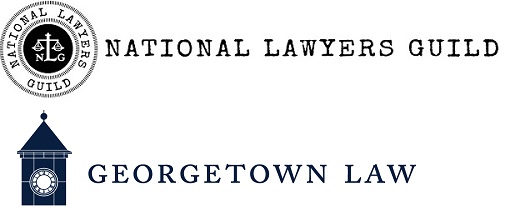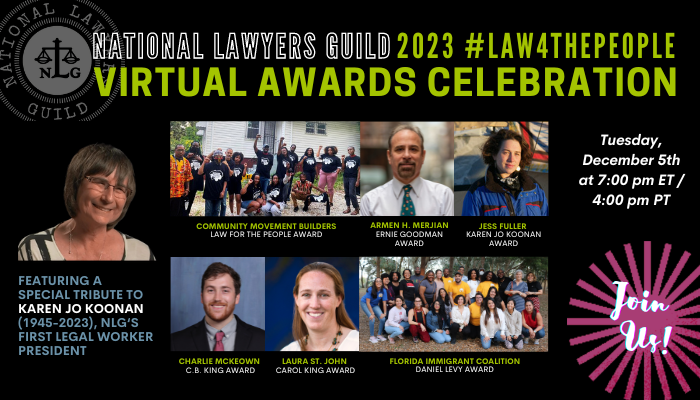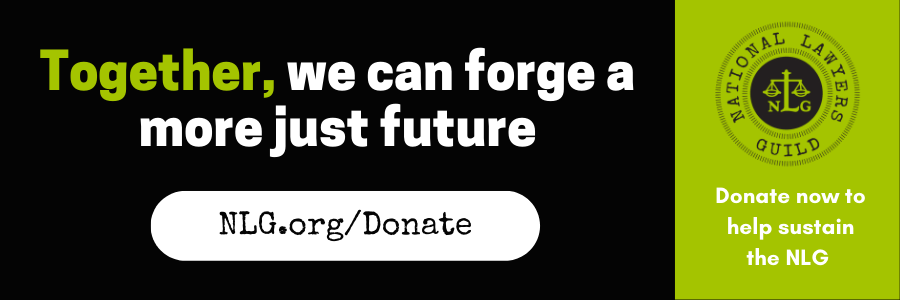Media Contacts: Stanley Holdorf, PLAN@nlg.org and Aderson Francois, Aderson.Francois@georgetown.edu
The DE-NJ NLG Prisoners’ Legal Advocacy Network (PLAN) has launched a three-year collaborative initiative with the Georgetown Law Civil Rights Clinic to challenge unconstitutional conditions of confinement in the aftermath of the 2018 national prison strike.
INITIATIVE PARTNERS: DE-NJ NLG Prisoners’ Legal Advocacy Network (PLAN) & Georgetown Law Civil Rights Clinic
DE-NJ NLG PLAN convenes diverse teams of attorneys, legal workers, law students, and jailhouse lawyers to contest allegedly unconstitutional conditions of confinement in United States prison facilities. PLAN has realized favorable outcomes for prisoners using an innovative approach that is unencumbered by the extensive time delays and costs associated with litigation, and the uneven access to witnesses and evidence, and difficult case law that is intrinsic to prisoners’ rights advocacy. Legal response teams adopt a group advocacy approach. Teams investigate and document rights violations reported by multiple prisoners through interviews with affected prisoners and witnesses; public records requests; and consolidation of evidence and affidavits, even if exhaustion of internal remedies is pending.
By serving correctional systems with notice of team findings, and legal analysis that clarifies prisoners’ rights and prison administrators’ obligations, PLAN triggers preservation obligations and creates discoverable public records of alleged prison conduct with supporting evidence and affidavits. While PLAN work product may assist litigation counsel and pro se litigants by sparing them the burden of pre-complaint investigation, its emphasis on alternative dispute resolution enables PLAN to challenge conditions and conduct that are normatively problematic, even when they are not anticipated or justiciable under prevailing case law (and even when exhaustion of remedies is reportedly obstructed). PLAN findings also intensify public pressure on prison systems to expedite concrete solutions for prisoners.
By analyzing anonymized data collected from prisoner declarations, PLAN identifies emerging trends in reported correctional conduct, and patterns and practices of alleged rights violations. PLAN Supervising Attorney Stanley Holdorf describes this primary source data as a quantified version of prisoners’ voices: “Widespread reports of misconduct in a given facility or jurisdiction serve to independently corroborate prisoners’ allegations, and help overcome prison administrators’ tendency to dismiss an individual prisoner’s claims by impugning their credibility.”
The Civil Rights Clinic at the Georgetown University Law Center operates as a public interest law firm staffed by student attorneys under the supervision of the Clinic director and teaching fellows. The Clinic represents individual clients and other public interest organizations, primarily in the areas of constitutional rights, open government, discrimination, and workplace fairness. Aderson Francois, Professor of Law and Director of the Civil Rights Clinic & Voting Rights Institute, says the Clinic frequently receives letters from prisoners expressing concern about their prison conditions: “Advocating for humane conditions of confinement is an important component of the constitutional rights remit of the Clinic. We sought a project partner with whom we could expand our case-by-case responses to prisoner requests for help.”
For the next nine semesters, Clinic student attorneys will staff PLAN legal response teams as Senior Clerks. Francois welcomes the partnership with PLAN as a catalyst to achieve substantial gains for prisoners that will afford student attorneys unique experiential learning opportunities: “PLAN’s group advocacy model expands the number of prisoners served. Clinic student attorneys on this project will engage in legal advocacy for prisoners. They will have occasion to apply the administrative and decisional law that governs the treatment of prisoners through direct engagement with prisoner-clients and correctional system personnel. In their roles as PLAN Senior Clerks, they will also assume peer supervisory roles, overseeing legal response teams in coordination with supervising attorneys.”
Holdorf says that PLAN looks forward to building a long-lasting partnership with the Clinic, predicated on a shared commitment to advocating for constitutional conditions: “Our legal responses to reports of prisoners’ rights violations will benefit immeasurably from the considerable talents and expertise the Civil Rights Clinic and its student attorneys bring to bear. While this initiative’s scope of work includes significant publication and public awareness raising components, the primary beneficiaries will be prisoners – both those who we assist directly and wider communities of incarcerated people who stand to benefit from the improved prison practices we hope to effect.”
Georgetown University Law Center 3L Lindsey Dennis and 2L Laurian Della are the first Civil Rights Clinic student attorneys and PLAN Senior Clerks under this joint initiative. Dennis was drawn to the project by their interest in human rights and desire to gain exposure to prisoners’ rights advocacy before embarking on a career in criminal law. Della is pursuing a career in education law. Her interest in PLAN stems from her experience assessing educational services provided by juvenile detention centers. Della says, “I observed firsthand what were, by any measure, substandard conditions and services in the majority of prison facilities I assessed. Correctional systems have an obligation to help prisoners prepare to re-enter community life through meaningful programming. These obligations can’t be met when wide disparities between policy and practice are allowed to persist.”
INITIATIVE FOCUS: Sharp Increase in Reports of Allegedly Unconstitutional Conditions of Confinement in the Aftermath of the 2018 National Prison Strike
In August 2018, prisoners nationwide participated in a variety of non-violent actions, such as work stoppages and sit-ins, to protest conditions of confinement that are arguably inconsistent with governing policies and law. Holdorf says that many prisoners report feeling that civil disobedience is their only recourse due to consequences of the Prison Litigation Reform Act (PLRA) and similar state statutes that were subsequently enacted: “These statutes have erected barriers to prisoner-filed civil rights actions under 42 U.S.C. §1983 and comparable state statutes that are often difficult to surmount. By protecting prison officials from accountability, the PLRA and corresponding state laws have apparently led to a sharp deterioration in conditions of confinement in United States prisons. Primary source data collected by PLAN indicates that some prison officials may feel emboldened to violate policies with impunity, while many incarcerated individuals feel deprived of meaningful access to due process and judicial relief, due to the protracted and readily undermined administrative remedy procedures mandated by these laws.”
After uncovering an American Correctional Association presentation following the 2016 national prison strike, which set forth precipitous correctional tactics for responding to facility “disturbances,” such as treating the free press as an “external influence” that needed to be “managed,” PLAN expected an escalated and more nationally coordinated correctional response to the 2018 national prison strike. However, Holdorf says that nothing could have prepared him for the outpouring of credible reports of staff-inflicted prisoner abuses that continue to pour in. “If a prisoner refuses to work or to follow a direct order, correctional officers have the authority to issue an incident report and convene a disciplinary hearing. If it is formally determined that a prisoner violated policy, prison facilities are within their legal rights to impose humane, proportional, and policy-approved sanctions, such as the revocation of certain privileges or good conduct time. This is not what we are seeing.”
In the seven-month period from the August 2018 strike through February 2019, PLAN received 278 reports and affidavits signed under penalty of perjury from prisoners in 22 states. This constitutes a 262% increase in the number of reports received by PLAN, relative to the preceding 7-month period. These post-strike affidavits allege unconstitutional conditions of confinement, such as excessive uses of force, withholding of meals and showers, segregation for unspecified periods without explanation, and other conduct that, if proven, arguably amounts to unconstitutional abuses of prison officials’ discretionary authority. “It is remarkable that these post-strike reports of prisoner abuse and retaliation originate from a number of different facilities. This suggests that a coordinated pattern and practice of abuse and retaliation, which is inconsistent with prisoners’ due process rights, has been implemented in some correctional systems in response to peaceful activism. For instance, in California, we have received reports of post-strike excessive uses of force in 11 different facilities, and allegations of post-strike due process violations in 13 different facilities,” said Holdorf.
JOINT LEGAL RESPONSE
This initiative will convene ten legal response teams in jurisdictions with particularly high incidents of independently corroborated reports of alleged prisoners’ rights violations in the aftermath of the 2018 national prison strike as follows:
- California
- Delaware/Pennsylvania
- Florida/Georgia/Alabama/Mississippi/Louisiana
- Michigan
- Missouri/Kansas/Nebraska
- New York
- North Carolina
- Ohio/Wisconsin
- South Carolina
- Texas
Each legal response team will analyze prisoner reports, questionnaires, public records requests, interviews with affected prisoners and witnesses, and other primary source material to determine:
- The frequency and kinds of alleged rights violations reported in the lead-up to, and aftermath of, certain critical incidents (e.g., peaceful actions such as the strike, incidents that followed lack of responsiveness to increased prisoner grievances about rights-violating conditions)
- Trends in reported prison retaliation against jailhouse lawyers and prisoner activists
Following careful review of applicable administrative and decisional law, prison policies and procedures, prisoner records and affidavits, and public records responses, each legal response team will then serve implicated correctional systems with administrative notice of team findings, to include any apparent disparities between governing law and prison practices. In cases that identify justiciable causes of action, legal response teams’ work product will be made available to any litigation counsel and/or pro se litigants. Limited support may be provided to prisoners’ rights litigation in some cases.
Media advisories will announce each administrative notice to raise public awareness of legal response team findings about prevailing prison conditions in their communities.
Legal response team findings, and a comparison of prisoners’ rights violations reported in the aftermath of the 2016 and 2018 national prison strikes, will be published in a joint report at the conclusion of the project period.
#
- Related:
- Georgetown Law Civil Rights Clinic
- DE-NJ NLG Prisoners’ Legal Advocacy Network (PLAN) Mounts Legal Responses to Widespread Reports of Prisoner Abuses in the Aftermath of the 2018 National Prison Strike
- NLG Endorses the #August21 Prison Strike
- Struggles of Using Legal Recourse as a Path Toward Better Prison Conditions
- 2018 National Prison Strike



